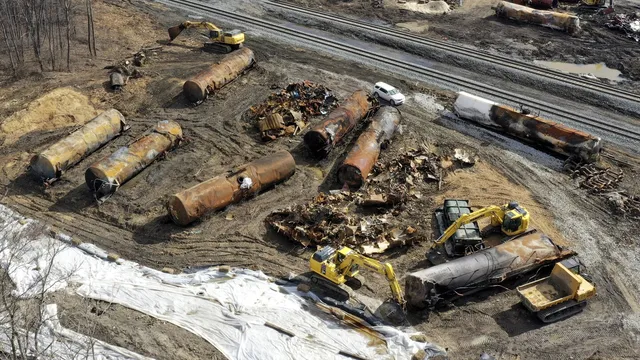
Ohio train derailment raises cancer concerns for East Palestine residents
2024-09-24 21:44- The EPA's reporting methods make it difficult for residents to understand the extent of contamination from the train derailment.
- Health experts express concerns that even low levels of chemicals could pose serious health risks, particularly cancer.
- Residents demand more transparency and comprehensive testing to ensure their safety and health.
Express your sentiment!
Insights
The Environmental Protection Agency (EPA) has faced criticism for its reporting methods following the Norfolk Southern train derailment in East Palestine, Ohio, which occurred last year. Residents are concerned about the potential health risks from chemical exposure, particularly regarding cancer. The EPA's test results often label chemicals as undetectable when they fall below a certain reporting limit, making it difficult for residents to understand the extent of contamination. Health experts warn that even low levels of chemicals, especially in mixtures, could pose serious health risks. Despite the EPA's assurances that short-term exposure does not significantly increase health risks, many residents remain skeptical. The agency has focused on levels that pose immediate threats, but there is a lack of research on the effects of combined chemical exposures. This uncertainty has led to calls for more transparency in reporting and testing. As cleanup efforts continue, some independent tests indicate that chemical levels in local creeks are improving, although potentially harmful substances still persist at low levels. A federal judge is set to hear arguments regarding a proposed $600 million class action settlement for residents affected by the derailment. Some residents argue that they lack sufficient information to assess the adequacy of the compensation offered. The ongoing situation highlights the need for clearer communication from the EPA and more comprehensive testing to ensure the safety and health of East Palestine residents. The complexities of chemical exposure and the potential long-term health implications remain a significant concern for the community.
Contexts
The recent train derailment in Ohio has raised significant cancer concerns among residents of East Palestine. This incident has occurred against a backdrop of heightened public safety issues, including bomb threats in Springfield that were later revealed to be hoaxes orchestrated from overseas. These threats led to evacuations and disruptions in the area, coinciding with an influx of Haitian migrants, further complicating local safety efforts. Republican lawmakers in Ohio are actively seeking updates on foreign election interference, which has become a pressing issue in light of the bomb threats. The combination of these events has created a tense atmosphere in the region, as local officials work to ensure the safety and well-being of residents amidst these challenges. The concerns surrounding the train derailment and its potential health impacts are compounded by the ongoing public safety issues, highlighting the need for effective communication and response strategies from local authorities. As residents grapple with the implications of the derailment, the broader context of safety and security in Ohio remains a critical focus for lawmakers and community leaders alike. In summary, the train derailment in East Palestine is not an isolated incident but part of a larger narrative of safety concerns in Ohio, which includes foreign threats and local disruptions.